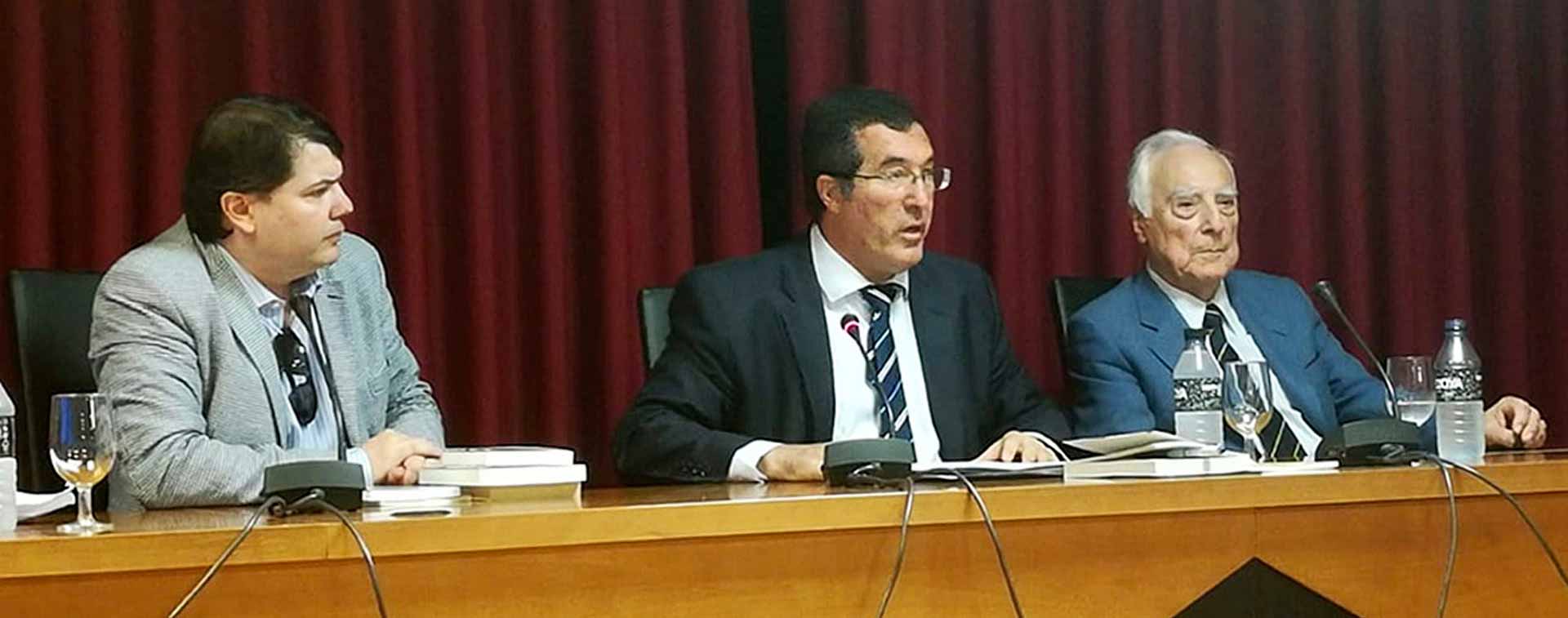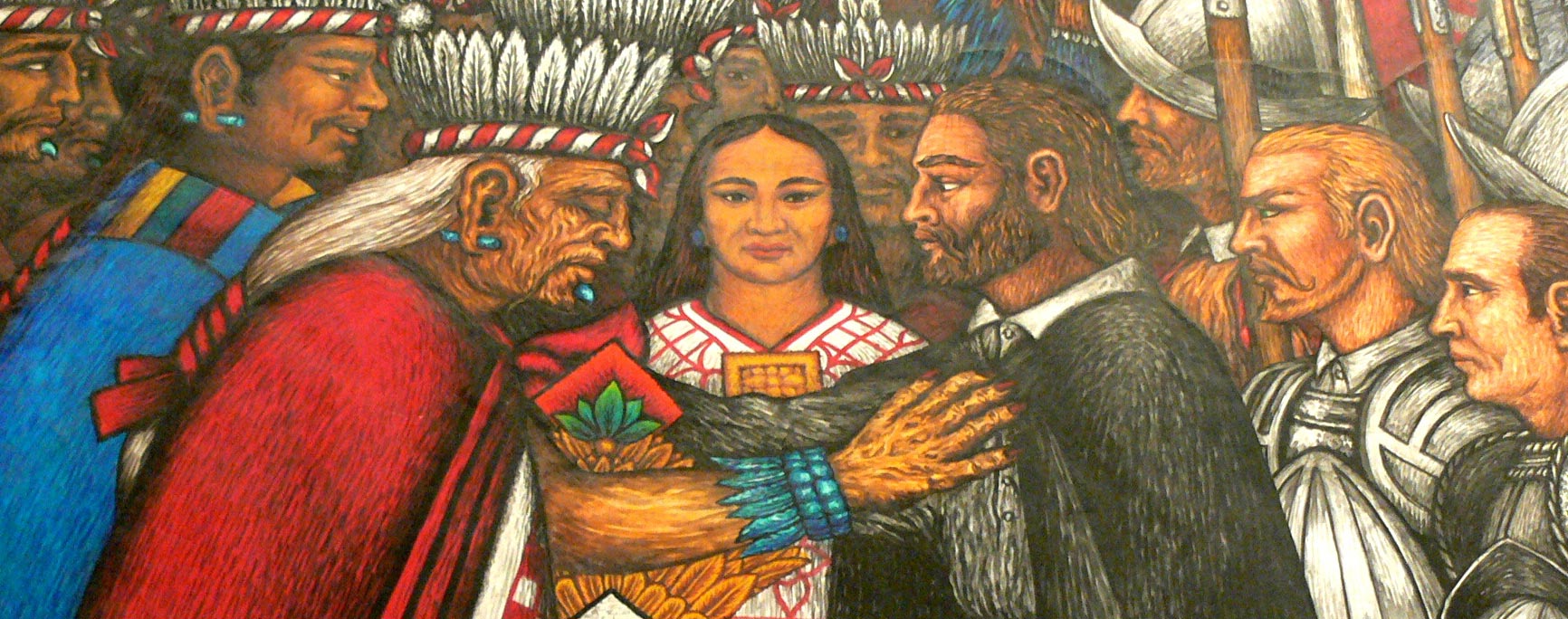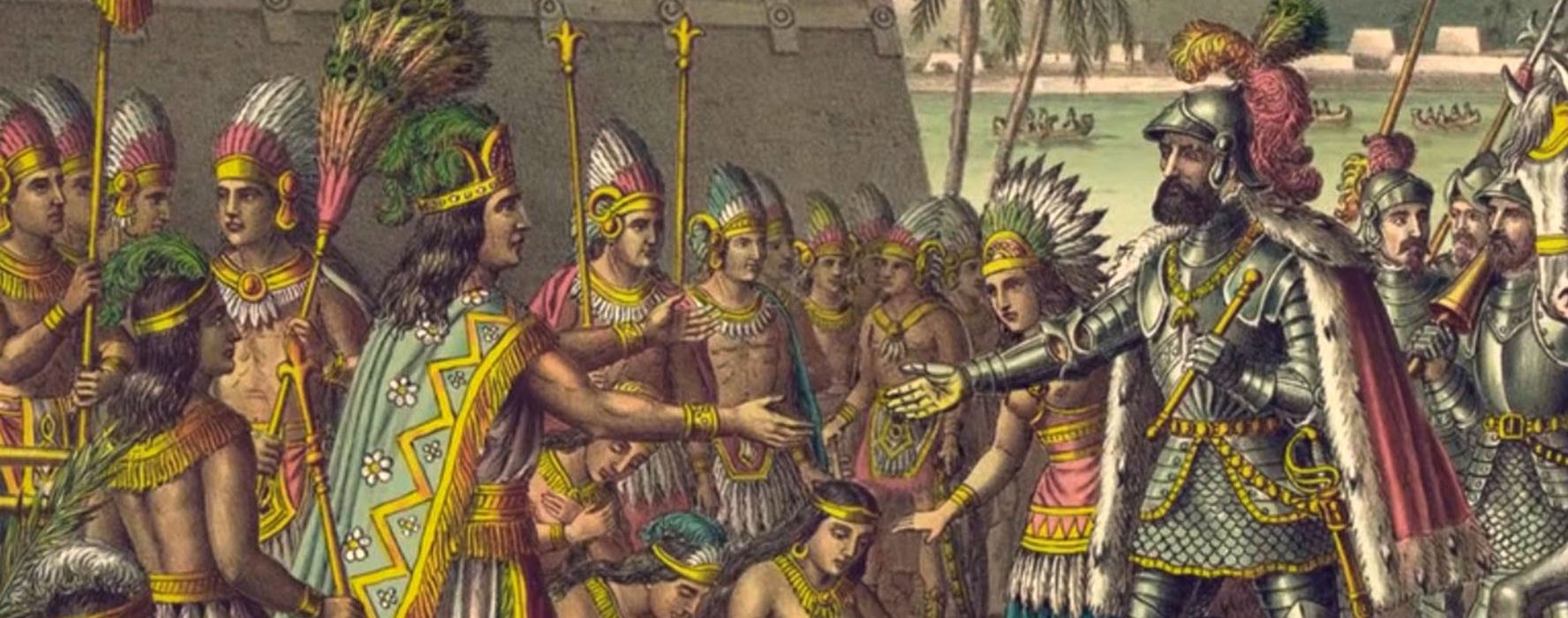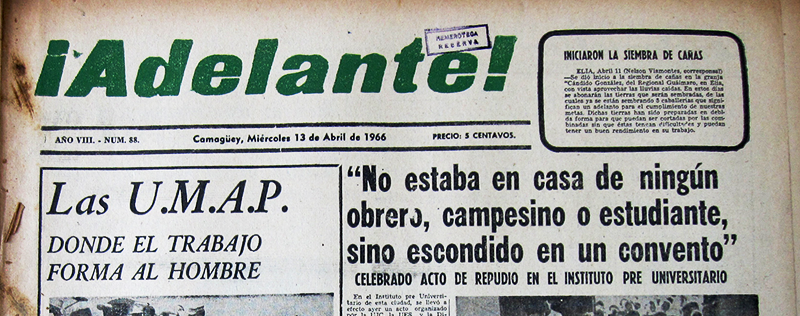Source:Libertad Digital
In Madre Patria, Marcelo Gullo tries to disprove the historical falsehoods that feed movements such as indigenism and independence.
Marcelo Gullo has a doctorate in Political Science from the Universidad del Salvador, in Buenos Aires, a master’s degree in International Relations specialized in History from the Institut Universitaire de Hautes Études Internationales of the University of Geneva, a degree in International Studies from the Diplomatic School of Madrid, a professor of the Superior School of War and the National University of Lanús and associate researcher of the Institute of Strategic Studies of the Fluminense Federal University.
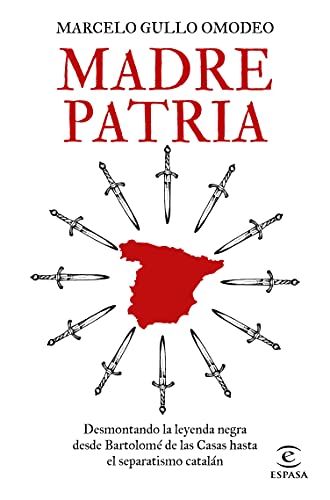
Cover of the book Madre Patria, by Marcelo Gullo.
His outstanding training has helped him focus his work on different lines. From Argentine-Brazilian relations to more generic studies on the historical construction of the power of nations, his books have been translated into languages such as French and Italian and recognized with various awards. Now it reaches bookstores with Madre Patria (Espasa), a detailed study of the lies that the Black legend continues to promulgate about the Spanish conquest of America and a review of the various international interests that have worked to keep it being disseminated still today. His intention, however, is to highlight the enormous and remarkable heritage that unites all the Spanish-speaking population in the world, in order to work on a future reconciliation devoid of complexes. We talk to him:
Question: There is a lot of talk about the Spanish Black Legend lately. But what great power has not suffered its own throughout history?
Answer: Well, England, to begin with. There is no black legend of the conquest of Australia. Where is it written? There is no black legend that speaks of the British conquest of North America. There is no black legend of the conquest of New Zealand. The English, when they went to Australia, considered it terra nullius, which means without inhabitants. However, they themselves came to census between six hundred thousand and one million indigenous people. They considered it terra nullius to justify its extermination. Because for them, they were not human beings. They were a kind of monkeys that walked on two legs. That’s why they did the Tasmanian genocide, in which only one woman survived, for example. It was the British who established the policy in North America that the best Indian was the dead Indian. And it was the Protestants, who were so Christian, who distributed smallpox virus blankets, using for the first time a kind of chemical weapon that exterminated the Indians. England has perpetrated several genocides, and yet there is no black legend of England. Just as there is no black legend of the Dutch conquest of Indonesia, which was equally terrible. Or of the American conquest of the Philippines, once the Spanish had been expelled.
Q: Does it all come down to the battle for the narrative, then?
A: Look, there is only one black legend here: that of the Spanish conquest of America. I ask you: Is there a black legend of the Arab conquest of all of North Africa? Arab chronicles relate that the Euphrates and Tigris rivers were covered in blood when they conquered Mesopotamia. It is also said that they conquered Egypt by preaching. But they conquered it by blood and sword, at the hands of Caliph Omar. When they invaded the Iberian Peninsula, they took twenty thousand Spanish virgins to Syria. That’s twenty thousand women between the ages of twelve and sixteen. Twenty thousand sex slaves. Without adding all the male slaves. Where is the black legend of the Arab conquest of Spain? Only one conquest is criticized: the Spanish. That is the historical truth.
Q: Why?
A: Well, simply because many of Spain’s enemy powers moved to defeat it politically because they couldn’t defeat it militarily. And then because the Spanish Habsbourgs did not understand what political propaganda was. They did not defend themselves against the propaganda attacks of their enemies, mainly France and England, along with Holland. When the French managed to seize the Spanish throne, moreover, forty years passed in which, with the first Bourbon, who was a Frenchman brought up in the hate to Spain, the Spanish theatres were filled with black-legendary plays. All of Madrid was full of plays that criticized the legacy of all the previous kings, the Habsbourgs, saying that they were murderers, rapists, and that all the conquerors had been the plague of the world. The genuflecting Francophile nobility went and applauded all that, which caused all Hispanic Americans to end up saying, well, since its their own confession, there’s no need for evidence.
Q: Isn’t it a bit strange that powers like England and France, also hegemonic in later centuries, focused on hatred of Spain and didn’t spread equally effective black legends against each other?
A: Well, first, they did not agree or focus exclusively on Spain. That does not exist in politics. Each was doing what favoured their own interests. But, in any case, you make a serious error of reasoning. Product, possibly, of a completely Eurocentric formation. France was not as hegemonic as you say. It had nothing. The one that had an empire in the world was Spain. France is going to have a colonial empire a long time later. But previously, it was nothing in the world. It was strong in Europe, only. You make the mistake of considering that because you were strong in Europe you were strong in the world. But the one that ruled the world was Spain. Not even England was that strong, which, especially at the beginning, only had a tiny bit between the Atlantic and the Appalachian Mountains. The one that had a real and consolidated domain of the mainland, which also went from California, almost Alaska, to the Pacific and the Philippines, was Spain. It was still the great territorial power in the world. And the equivalent big market in the world. Economists amaze me because they don’t study anything. They talk about the beginnings of the world market without mentioning many times that, for a long time, the world market was Hispanic America. Asia was there, yes, but the great production market was Spanish.
Q: You write that the Spanish Empire is not the same as British imperialism
A: Exactly. They are two different things. Spain built an Empire, which is not the same as developing imperialism in the manner of the British. Spain arrives in America with the imprint that Isabel the Catholic gives them. That is why their approach was different from that of France or Portugal. Both countries were Catholic, and yet their imprint was different. Why? Well, because there was a woman in history, who is Isabel, who did not know what world she was encountering. No chance she could know. But, faced with this new world, which she could not fully describe or understand, she took some fundamental measures, which ended up being unique in the history of humanity. Measures that the Spaniards of today, because they do not study, they do not even know well. Isabel says that the people who were there, who she didn’t even know who they were, were going to be subjects of Castile. Therefore, they could not be slaves. In addition, she did not want to establish colonies, but she wanted to make kingdoms. But she made one more decision, unique in history: the policy of miscegenation. She said: get married, Indians and Spaniards. When a State says such a thing, what it is saying is that it wants to merge with the other, not supplant it. When one merges with the other, there cannot be a will of exploitation. The other is the same as me. Spain adopts America and the Americans; it makes them its children. And those children, since they are destined to inherit his property, must be educated in the best possible way. Can you imagine Queen Victoria telling the English in 1848 to marry the Chinese? Did it ever happen? No. The Anglo-Saxons defend themselves against this by saying that the Spanish had an overflowing sexual appetite, of course. And that, because they took their women on the ships, they didn’t have that same appetite. But that is absolutely false. The Anglo-Saxons also had relationships with Indian women or with black slaves. The difference is that Jefferson, for example, sold the children he had with black slaves as slaves, because for him they were not human beings. Cortés, however, considered the son he had with Doña Marina his son, making him to be odered a Knight of the Order of Santiago. The difference is remarkable. Why? Because the Spanish expansion policy was never destined to consider the new territories as mere loot. Of course there could have been exceptions afterwards, and people who behaved in a very reprehensible way. But men are not angels. Otherwise there would be no laws or criminal law. The fundamental thing is that the attitude of Spain, its State policy, was one of respect and integration. Something much more advanced than English policies, which supplanted the indigenous populations after eliminating them or, when they could not kill them, developed apartheid policies, as in South Africa. The Spanish empire is only similar to that of Rome, and superior to it in some respects. This is the second time in history that this has happened. The English empire is something else.
Q: You also rescue in the book the importance of Francisco de Vitoria and the Spanish attitude when advocating the emergence of what would later be human rights. Do we remember it properly, or have we forgotten?
A: It is something that has been completely forgotten. And Father Francisco de Vitoria, at least, was rescued by the Americans, funny enough. They were the ones who realized, with great intellectual honesty, it is only fair to acknowledge, that he had been the great precursor. It is from the United States where Vitoria begins to be valued, when in Spain he was already a forgotten figure. The USA, as a state policy, preached the black legend, but, being a democracy and enjoying academic freedom, they also gave rise to voices from the universities that recognized the good Spanish legacy. They were a minority, yes, but they were the first to recognize the work of Spain in America.
Q: How do you explain the rise of indigenism?
A: Well, you have to take this apart. I have already commented before that in Spain the Habsbourgs never defended themselves from the bad foreign press and that, thanks to the first Bourbon, the black legend infiltrated fully within the borders of the Spain and the whole Empire. What happens is that later, with the passage of time, the new differential factor was that the left also adopted those same black-legendary positions. They are different times, but it explains the evolution and permanence of the Spanish black legend. On the other side of the Atlantic, in Hispanic America, the black legend was born in the wealthiest sectors of society, not linked to the land, but to the smuggling with England and to illegal trade. During the various processes of independence, the indigenous masses fought for the unity of the Empire. There is the so-called Royal Army of Peru, made up of Indians. The black legend was a minority in society, as I say, but it had been adopted by the wealthiest men, who would end up ruling the new governments. In this way, they established new state policies, and established the new history of Spain in schools. Although the next step is even more decisive. In 1934 there was a meeting of the communist parties in South America. It is then that they decide to adopt the black legend as well and to promulgate it. And that is despite Marx being never a black legender himself. In fact, he had a positive view of the conquest. But the Left thought that politically it could benefit them. Why? Well, because the black legend inevitably leads to indigenous fundamentalism. If Spain only came to steal, rape and kill, and before what there was an original paradise and a communist utopia made up of noble savages, the historical and political claims of these groups would be justified. They had to reject, therefore, everything that came from Spain: the values, the customs, the language and everything else, with the sole objective of returning and creating indigenist republics.
The narrative was also good for them because a civil conflict with communist overtones in Hispanic America would help destabilize the backyard of the United States and the West, in general. If, on top of all that, they managed to establish the dictatorship of the proletariat in some of those republics, then all the better. That is the exact moment in which the Communist Party becomes a black legend instrument in all of Hispanic America, and in which all of them begin to publicize every book and pamphlet written in that direction. It is an interesting process, because a cultural battle was generated between them and an important current of Hispanists, who opposed them. What happened next is that the balance tilted in their favour in the eighties, when work began to commemorate the five hundred years of the discovery. Since then, the black-legendary wave has been acquiring a force that it had never had, partly because the left has been taking over the universities and partly because, with the fall of the Berlin Wall, it has been prioritizing the cultural horizon before the economic one. For all this, Hispanophobia is today one of the pillars of progressivism.
Q: In the book you classify indigenism and Catalanism as “twin brothers”. What do they have in common, exactly?
A: I say that they are twin brothers because, as well as there is a part of Spain that accepts the black legend, the peripheral nationalists considered that it was also a great argument in their favour. If Spain went to America to conquer, rape and kill, it did the same with them. That’s what they say. It is a completely false argument, which does not hold up historically. Just as false as that of the indigenists, on the other hand. They know perfectly well that it is a lie, moreover, but they teach it in schools so that, little by little, the concept that the new generations have embedded in their heads is that they are not part of Spain and that they live oppressed by an invading State. If Spain is a monster, what you have to do is separate from it, of course. It’s that simple.
Q: In recent years many indigenous movements have been seen demolishing statues in Hispanic America. Is that the reality, or do we perceive it deformed from Spain?
A: It’s that one and it’s worse. Today indigenism is booming, of course. But not only knocks down statues. The Mapuche movement in Argentina, for example, which everyone knows is financed by Britain, has not only destroyed statues in the south. They burn cars, attack Argentinians and, if they don’t leave, they even burn down their houses to get them to leave Patagonia. That is the truth of what is happening. They don’t just burn statues.
Q: Where is the optimism of that possible reconciliation of the Hispanic world that you advocate for in the book, then?
A: The optimism comes from knowing that they are a minority, even though they hold cultural hegemony. The reality is that they are a minority. Its hegemony comes from two causes: a large mass of the population is uninformed, on the one hand, and the few who know, for fear of challenging political correctness, remain silent. Now, since they not only do not have the truth, but are actually a minority, it is only necessary that the Spaniards who do know, begin to speak and make things clear. Their power only comes from misinformation and silence. The lukewarmness of those who do not dare to oppose political correctness, for fear of being expelled from the university, or of social disrepute, is what gives them their strength. Merely and exclusively that. A minority has imposed a cultural dictatorship that will have perverse political effects. But this happens only because no one dares to confront them. The reality is that the king is naked. It just needs to be pointed out.
Q: Is there a chance that, by fighting the lies of the black legend, some will fall into the pink legend?
A: That is nonsense. If someone says that two plus two equals four, and another goes and says no, that two plus two equals five, the good thing is not to say that neither for one nor for the other, that two plus two equals four and a half. If two plus two equals four, two plus two equals four. And that’s the end of it. There is no pink legend of the Spanish conquest of America. I am amazed at the degree of absolute ignorance that you guys display. Spanish no longer know what they did in the world. But if you don’t study, I’m not to blame. There is not such thing as a pink legend. The reality is that the legacy of Spain in America is so different from everything that happened in the rest of the world afterwards, that when compared to others’ actions, it comes across as rosy. It seems made up. But is not. That’s what’s impressive. It seems that it is not possible for someone to have behaved in such a way. Look, I don’t come from a Spanish family, nor Hispanist. I come, in fact, from a family believer in the black legend. But when one begins to put things into perspective, one begins to see that, against all the positive things that can be highlighted about the Spanish conquest, there are hardly any negative things. And that is not to deny that there were. Of course there were. The opposite would be to think that it was a historical experience carried out by angels and not by men. Of course there were people who behaved abusively. There were rapists and murderers. Of course. In every historical experience there are those. But when one observes the Spanish historical experience, one must become amazed because it is completely different from the rest. A similar phenomenon will not be repeated in history. Spain created thirty-three universities in America. How many did France create in Africa? One, in Algeria. How many did Portugal create in Africa? One. How many did Belgium create in the Congo, or Germany? Of course, none. The Spanish historical experience is amazing. Of course, modern man cannot exactly get into the mentality of those men who carried it out. But that does not mean that, in comparison, the Spanish was the most amazing conquest in history. And I repeat, that does not mean that it was a paradise on earth. There are never paradises. We are humans. But things are as they are, it is not necessary to paint them worse than they were to make them seem more credible. The reality of the Spanish conquest is what it is.
Q: Is there a serious Hispanic response, then?
A: There are Spaniards who are responding, of course. Elvira Roca Barea, for example. Ibañez. There are many. There is an answer awakening. And it is something that can be seen very well in the acceptance, for example, that the documentary made by José Luis López Linares, has had in Spain, Spain, the first globalization, has been extraordinarily successful. Venues filled up to the top, and people applauding at the end. That is proof that a lot of things can be done to explain the real history. With its lights and shadows. That a documentary like this, without any backing publicity, has filled up the cinemas of Spain, is quite striking, don’t you think?
Share this article
On This Day
No Events
History of Spain
26 August 2020
27 January 2021
Communism: Now and Then
23 December 2022
28 July 2021
